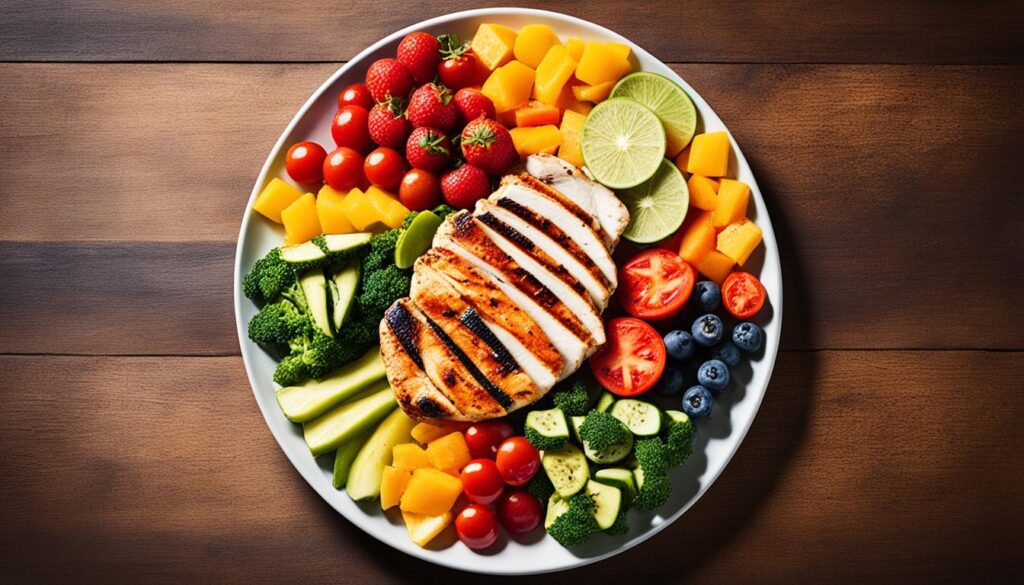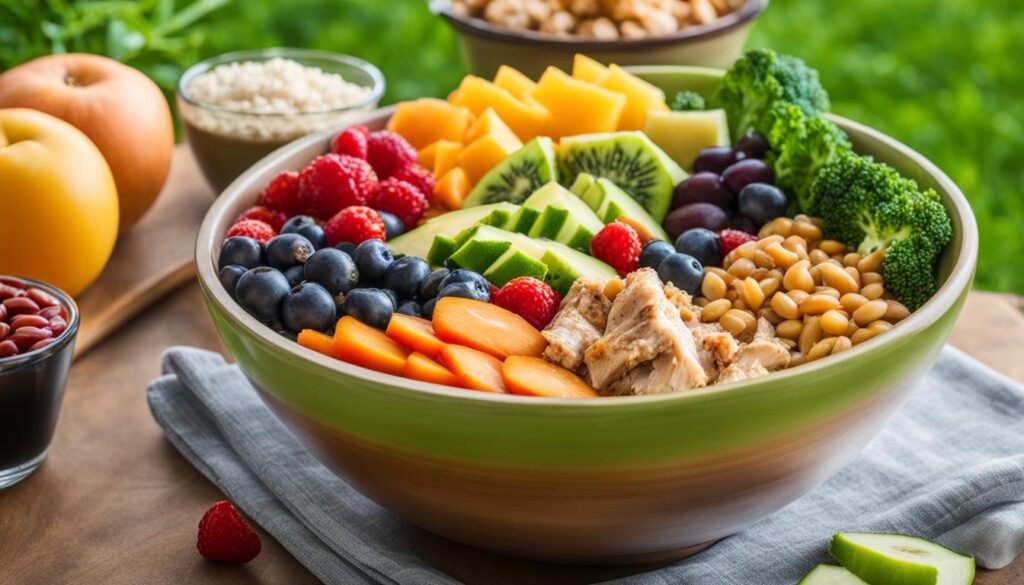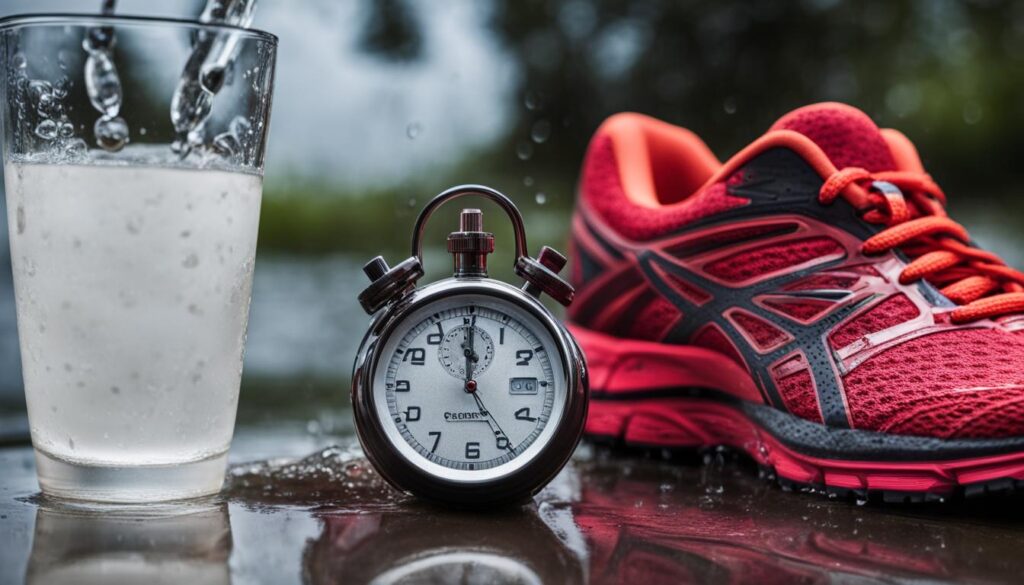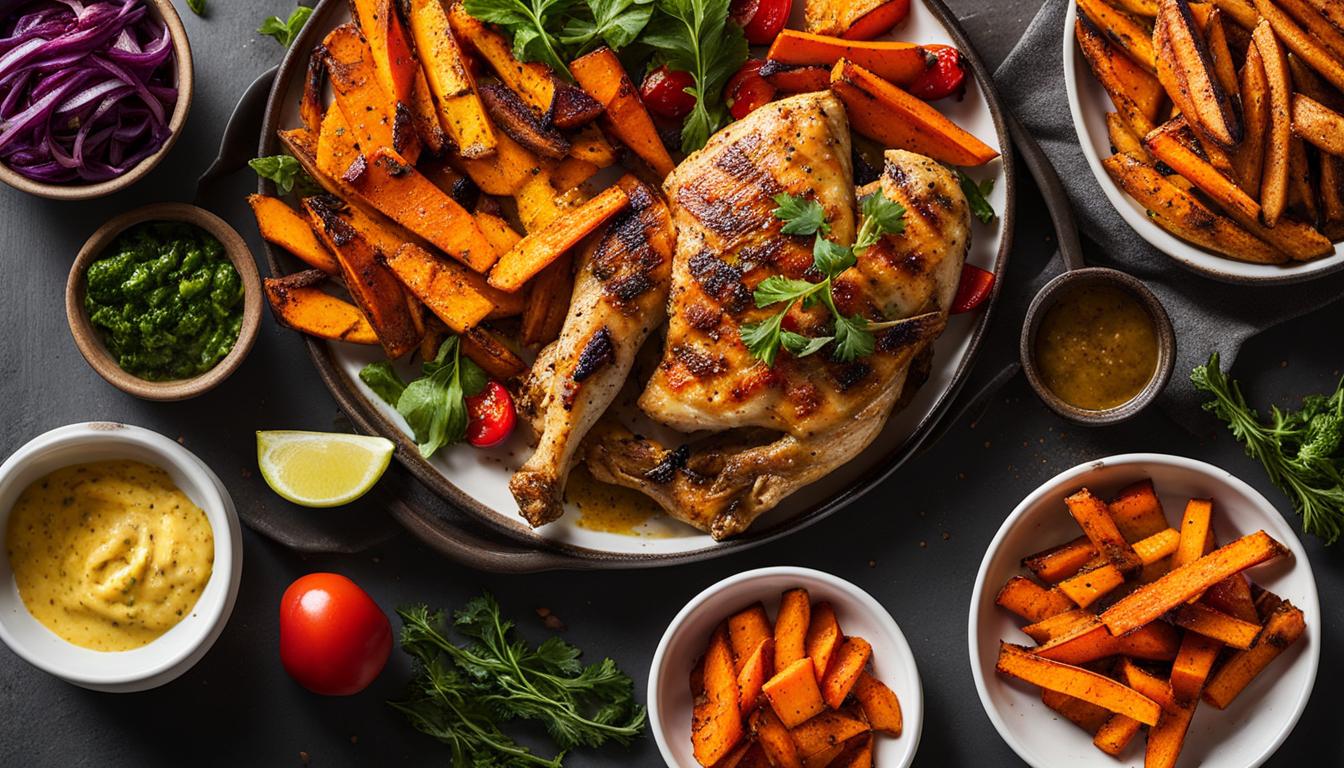After a grueling workout session, it’s important to give your body the right nutrients it needs to recover and maximize fat burn. Whether your goal is sustainable eating, weight loss, or overall healthy living, focusing on post-workout nutrition can make a significant impact on your results.
When it comes to healthy post-workout nutrition, consuming the right combination of protein and carbohydrates is key. Protein helps decrease muscle protein breakdown, increase muscle protein synthesis, and support muscle recovery, while carbohydrates restore glycogen stores and provide energy for your body.
To get the most out of your post-workout meals, it is recommended to consume 20-40 grams of protein every 3 to 4 hours. This helps to maximize protein and glycogen synthesis, promoting efficient muscle recovery and growth.
So, what are some examples of optimal post-workout meals? Think of protein-rich foods like lean meats, poultry, fish, eggs, or plant-based protein sources such as tofu or legumes. Pair them with healthy carbohydrates like sweet potatoes, quinoa, fruits, or whole grains for a balanced and nutrient-rich meal.
Is fat-burn your primary focus? Incorporate metabolism-boosting foods like green leafy vegetables, spicy peppers, or green tea into your meals for that extra boost. By choosing the right combination of macronutrients and nutrient-dense ingredients, you can tailor your post-workout meals to your specific goals.
Key Takeaways:
- Consuming the right nutrients after exercise is crucial for optimal muscle recovery and fat burn.
- Protein and carbohydrates should be the main focus of your post-workout meals to support muscle repair and glycogen replenishment.
- Including metabolism-boosting foods and nutrient-dense ingredients can further enhance the fat-burning effect.
- Remember to personalize your post-workout meals based on your individual goals and preferences.
- Stay consistent with your healthy eating habits and make post-workout nutrition a priority to support your fitness journey.
Importance of Eating after a Workout
After a workout, it’s crucial to prioritize post-workout nutrition for optimal muscle recovery and growth. Consuming the right nutrients plays a vital role in replenishing glycogen stores, rebuilding muscle proteins, and stimulating muscle growth.
During exercise, our muscles rely on glycogen as a source of energy. As we engage in physical activity, our glycogen stores are depleted. Eating carbs after a workout helps replenish these stores, providing the fuel needed for future workouts and preventing muscle breakdown.
Additionally, intense exercise can lead to the breakdown of muscle proteins. To stimulate muscle recovery and growth, it’s important to provide our bodies with adequate protein post-workout. Protein contains amino acids, which are essential for rebuilding and repairing damaged muscle tissue.
By consuming the right balance of carbs and protein after a workout, we provide our bodies with the necessary nutrients to optimize recovery, rebuild muscles, and stimulate muscle growth. Including both these macronutrients in our post-workout meals is essential for achieving our fitness goals and maximizing the benefits of our workouts.
“Post-workout nutrition is a key component of my clients’ fitness journey. By focusing on replenishing glycogen stores and rebuilding muscle proteins, we can accelerate recovery and promote muscle growth. Incorporating a combination of carbs and protein in post-workout meals is vital for achieving optimal results.”
– Fitness expert and nutritionist, Lisa Thompson
Protein, Carbs, and Fat in Post-Workout Meals
Each macronutrient – protein, carbs, and fat – is crucial for post-workout recovery. Let’s explore how these nutrients play a role in muscle repair and synthesis.
The Power of Protein
Protein is the building block of muscle tissue and plays a vital role in protein synthesis. Consuming adequate protein after a workout helps repair and build muscles, facilitating muscle repair and growth. It is recommended to consume 20-40 grams of protein every 3 to 4 hours to support optimal post-workout recovery.
The Role of Carbs
Carbs are essential for replenishing glycogen stores after exercise. The recommended amount of carbs varies based on the type and intensity of your workout. For example, endurance activities may require more carbs to replenish glycogen compared to strength training. Including adequate carbs for recovery ensures optimal muscle recovery and prepares the body for future workouts.
The Mystery of Fat
The impact of fat on post-workout recovery is not entirely clear. While fat may not have a direct negative effect, it is essential to prioritize protein and carbs for optimal recovery. Incorporating healthy fats into your overall diet is important, but they may not play a significant role in immediate post-workout nutrition.
A Practical Approach
To enhance glycogen storage and muscle protein synthesis, it is recommended to consume a ratio of 3 to 1 (carbs to protein) in post-workout meals. This practical approach ensures sufficient carbohydrate replenishment and supports muscle repair and growth. Balancing your macronutrient intake can optimize post-workout recovery.
Table: Macronutrient Breakdown in Post-Workout Meals
| Macronutrient | Role | Examples |
|---|---|---|
| Protein | Repair and build muscle | Chicken breast, Greek yogurt, protein powders |
| Carbs | Replenish glycogen stores | Sweet potatoes, fruits, rice cakes |
| Fat | Support overall diet | Avocado, nuts, nut butters |
Timing of Post-Workout Meals
The timing of post-workout meals plays a crucial role in promoting muscle recovery and optimizing glycogen synthesis. It is recommended to consume a combination of carbohydrates and protein as soon as possible after exercise to maximize the benefits of your workout.
Contrary to popular belief, the post-exercise window for consuming protein is wider than initially thought, extending up to several hours after your workout. This means that even if you had a meal rich in carbs and protein before your training session, the positive effects of that meal still apply and contribute to muscle recovery.
Continuing to fuel your body with small, well-balanced meals consisting of carbohydrates and protein every 3-4 hours is also essential for ongoing recovery. By providing your body with the necessary nutrients at regular intervals, you support glycogen replenishment, optimize muscle protein synthesis, and maintain an environment conducive to muscle recovery.
Remember, post-workout nutrition extends beyond the immediate meal following exercise. It involves strategically timing your meals throughout the day and maintaining a consistent intake of balanced nutrients to support your body’s recovery process.
“By consuming a post-workout meal rich in carbohydrates and protein and following it up with continued balanced meals, you provide your muscles with the fuel they need to recover and adapt to exercise.”
Sample Timing Guidelines for Post-Workout Meals
Here are some sample timing guidelines to help you plan your post-workout meals:
| Exercise Timing | Ideal Post-Workout Meal Timing |
|---|---|
| Morning workout (fasted) | Within 30 minutes after exercise |
| Mid-day workout | Within 1-2 hours after exercise |
| Afternoon/evening workout | Within 2-3 hours after exercise |
These timing recommendations are flexible and can be adjusted based on your schedule and individual preferences. The goal is to provide your body with the necessary nutrients as soon as possible after exercise to support optimal muscle recovery and glycogen synthesis.
Having a clear understanding of the timing of your post-workout meals and the importance of continued balanced meals throughout the day will help you maximize the benefits of your exercise routine and support your overall fitness goals.
Foods to Eat after a Workout
After a workout, it’s important to replenish your body with the right nutrients to aid in recovery and maximize the benefits of your exercise. Here are some post-workout meal ideas that provide the necessary nutrient replenishment:
Easily Digestible Carbs:
- Sweet potatoes
- Quinoa
- Fruits
- Rice cakes
- Oatmeal
Easily digestible carbohydrates are essential for replenishing glycogen stores and restoring energy levels after a workout.
Protein Sources:
- Animal or plant-based protein powders
- Eggs
- Greek yogurt
- Cottage cheese
- Salmon
- Chicken
Protein is crucial for muscle repair and growth. Including a good source of protein in your post-workout meal helps support muscle recovery.
Healthy Fats:
- Avocado
- Nuts
- Nut butters
- Seeds
- Trail mix
Incorporating healthy fats into your post-workout meal provides satiety and aids in nutrient absorption. They also help support overall health.
Here are some post-workout meal ideas:
Grilled chicken with roasted vegetables and rice
Eggs with avocado on whole-grain toast
Yogurt with berries and granola

Including a combination of easily digestible carbs, protein sources, and healthy fats in your post-workout meal is key to promoting muscle recovery, replenishing nutrients, and fueling your body for future workouts. Adjust the portion sizes based on your individual needs and goals.
Sample Post-Workout Meals and Snacks
Incorporating nutrient-dense meals after your workout is essential for optimal recovery and maximizing the benefits of your training. I’ve compiled a list of delicious post-workout meal options that provide a balance of protein, carbs, and healthy fats to help fuel your body’s recovery process.
Meal Combinations:
- Grilled Chicken with Roasted Vegetables and Rice: This protein-packed meal combines grilled chicken breast with a delicious mix of roasted veggies, such as broccoli, bell peppers, and zucchini. Serve it alongside a serving of brown rice for a wholesome post-workout option.
- Egg Omelet with Avocado Spread on Whole-Grain Toast: Start your day with this protein-rich breakfast option that includes a fluffy egg omelet filled with veggies like spinach and tomatoes. Top it off with a spread of mashed avocado on a slice of whole-grain toast.
- Salmon with Sweet Potato: Enjoy the benefits of omega-3 fatty acids with a grilled or baked salmon fillet paired with a side of roasted sweet potatoes. This combination provides a good source of protein, healthy fats, and complex carbs.
Snacks for Recovery:
- Tuna Salad Sandwich: Prepare a tuna salad using canned tuna, Greek yogurt, and diced vegetables like celery and onions. Spread it between slices of whole-wheat bread for a protein-packed snack.
- Cottage Cheese with Fruits: Boost your protein intake with a serving of cottage cheese topped with your favorite fruits, such as berries or sliced peaches. Cottage cheese is a great source of casein protein, which is slowly digested and helps promote muscle recovery.
- Rice Crackers with Peanut Butter: Indulge in a crunchy and satisfying snack by spreading natural peanut butter on rice crackers. This combination offers a mix of carbs, protein, and healthy fats.
Remember to customize your post-workout meals and snacks based on your individual nutritional needs and goals. These sample options are packed with essential nutrients to aid your body’s recovery process and keep you on track towards achieving your fitness goals.
Explore the variety of options and experiment with different meal combinations to find what works best for you. Now that you have some inspiration, let’s move on to the next section to understand the importance of hydration in your post-workout routine.
Importance of Hydration
Proper hydration is crucial for optimal post-workout recovery and performance. When we exercise, we sweat, leading to fluid and electrolyte losses that need to be replenished. Hydration helps restore the body’s fluid balance and supports the replenishment of vital electrolytes.
Drinking water regularly throughout the day is essential, both before and after a workout. Adequate water intake ensures that our body functions optimally, supporting digestion, nutrient absorption, and muscle function. For intense exercise or activities lasting more than an hour, electrolyte drinks may be necessary to replenish lost electrolytes.
Rehydrating after a workout not only quenches our thirst but also helps maintain the internal environment necessary for the body to maximize post-workout benefits. By replenishing fluids and electrolytes, we can support our recovery process and enhance our overall performance.

The Role of Electrolytes
Electrolytes such as sodium, potassium, calcium, and magnesium play a vital role in maintaining fluid balance, muscle function, and nerve impulses in our body. During exercise, these electrolytes are lost through sweat. By replenishing electrolytes after a workout, we support proper muscle contractions, nerve conduction, and hydration status, contributing to optimal recovery.
Staying Hydrated for Maximum Results
Ensuring adequate hydration is crucial for achieving our fitness goals. By staying properly hydrated, we support our body’s ability to recover effectively, enhance muscle repair, and optimize future workouts. Hydrating before and after a workout is a simple yet powerful way to maximize our post-workout gains and overall performance.
The Bottom Line on Post-Workout Nutrition
When it comes to post-workout nutrition, there are a few key factors to keep in mind. Consuming the right amount of carbs and protein after exercise is crucial for stimulating muscle protein synthesis, improving recovery, and enhancing performance in future workouts.
Studies have shown that consuming protein after a workout helps decrease muscle protein breakdown and increase muscle protein synthesis, leading to muscle repair and growth. It is recommended to consume 20-40 grams of protein every 3 to 4 hours to support optimal muscle recovery.
In addition to protein, consuming carbs after a workout is important for replenishing glycogen stores. During exercise, muscles use up glycogen, and consuming carbs after a workout helps restore these energy reserves. The amount of carbs needed varies based on the type and intensity of the exercise.
The timing of post-workout nutrition is also critical. While it was once believed that there was a short window immediately after exercise to consume nutrients, recent research suggests that the post-workout window may be wider than initially thought. It is generally recommended to consume a post-workout meal or snack within a few hours after exercise to optimize recovery.
Planning ahead and making optimal choices for healthy snacks after exercise can help ensure you’re fueling your body with the nutrients it needs. Opt for nutrient-dense options that provide a balance of carbs, protein, and healthy fats. This can include options like Greek yogurt with berries, a protein smoothie with banana, or a turkey and avocado wrap.
Personalizing your post-workout meals based on your individual needs and specific goals is essential. Consider factors such as your training intensity, duration, and overall calorie needs. Consulting with a registered dietitian can help you tailor your post-workout nutrition plan to optimize recovery and prepare your body for future workouts.
Remember, post-workout nutrition plays a crucial role in maximizing the benefits of your exercise routine. By fueling your body with the right nutrients, you can support muscle protein synthesis, enhance recovery, and improve overall performance.
What to Eat After a Workout – Recommendations from Registered Dietitians
After a workout, it’s essential to replenish the nutrients your body needs for optimal recovery. Registered dietitians recommend a combination of carbohydrates and lean proteins to refuel and repair your muscles. Incorporating healthy fats and staying hydrated are also crucial for post-workout nutrition.
When it comes to protein intake, choose lean sources such as poultry, tuna, egg whites, protein powders, or tofu. These options provide the necessary amino acids to support muscle repair and growth.
Carbohydrates play a vital role in replenishing glycogen stores and providing energy. Include complex carbs like quinoa, oats, bananas, whole-grain pasta, or rice in your post-workout meal. These carbs have a lower glycemic index, ensuring a steady release of energy.
Don’t forget about healthy fats, which provide essential nutrients and promote satiety. Add sources like avocados, nuts, nut butters, seeds, and olive oil to your meals for a well-rounded nutrient profile.
Staying hydrated is equally important. Drinking water regularly throughout the day helps maintain fluid balance and supports overall performance. If your workouts are intense or prolonged, you may need to replenish electrolytes with sports drinks.
Meal Examples
Here are some meal examples that incorporate recommended post-workout nutrients:
- Vegetable and Cheese Omelet with Whole Wheat Toast: Make a delicious omelet with mixed vegetables and cheese, served with a slice of whole wheat toast. This meal provides a balance of protein, carbs, and healthy fats.
- Turkey Sandwich with Tomato and Avocado: Prepare a turkey sandwich with whole grain bread, sliced tomatoes, and mashed avocado. This option is packed with lean protein, complex carbs, and healthy fats.
- Stir-Fry with Vegetables and Shrimp, Tofu, or Chicken: Create a flavorful stir-fry with a variety of vegetables and your choice of protein. Pair it with brown rice or quinoa for a well-rounded post-workout meal.
Remember, these are just a few examples, and you can customize your post-workout meals based on personal preferences and dietary restrictions. Consult with a registered dietitian for personalized recommendations that align with your specific goals and needs.
Replenishing nutrients, especially protein and carbohydrates, after a workout is crucial for muscle recovery and overall fitness. Incorporating healthy fats, staying hydrated, and consuming a well-balanced meal will optimize your post-workout nutrition journey.

Tailoring Your Post-Workout Meal to Your Workout
When it comes to post-workout nutrition, customization is key. Tailoring your meal to your specific workout type and intensity can optimize recovery and replenishment. Let’s explore how you can customize your post-workout meal to meet your individual needs:
1. Workout Type
Whether you engage in strength-training exercises or aerobic workouts, understanding the demands of your chosen exercise regimen is crucial. Different workout types require specific nutrients to support optimal recovery.
“Strength-training workouts may benefit from increased carbohydrate intake for glycogen replenishment, while aerobic exercises may prioritize fluid and electrolyte replacement.”
2. Workout Intensity
The intensity of your workout also plays a role in determining your post-workout meal. More intense workouts can deplete glycogen stores and increase fluid and electrolyte losses. Therefore, adjusting your nutrient intake based on workout intensity is essential for adequate recovery and performance enhancement.
3. Glycogen Replenishment
Glycogen, the stored form of carbohydrates in the body, gets depleted during exercise. To replenish glycogen stores, it is important to consume an adequate amount of carbohydrates in your post-workout meal. The amount of carbohydrates needed can vary depending on the duration and intensity of your workout.
4. Fluid and Electrolyte Replacement
Fluid and electrolyte balance is crucial for optimal exercise performance and recovery. Strenuous workouts can lead to sweat loss and electrolyte imbalances, necessitating proper hydration and electrolyte replenishment. Including fluids and electrolyte-rich foods in your post-workout meal can help restore balance and support recovery.
By tailoring your post-workout meal to your specific workout type, intensity, and recovery needs, you can optimize your body’s replenishment process. Remember to prioritize glycogen replenishment and fluid and electrolyte replacement to support muscle recovery and overall performance.
Example Post-Workout Meal Customizations:
| Workout Type | Post-Workout Meal |
|---|---|
| Strength-training | Grilled chicken breast with quinoa and steamed vegetables |
| Aerobic exercise | Hydrating smoothie with banana, spinach, almond milk, and a pinch of sea salt |
| High-intensity interval training | Salmon with sweet potato and a side of mixed greens |
Staying Hydrated Pre and Post-Workout
Staying hydrated is crucial for optimal performance and recovery during your workouts. As a fitness enthusiast, I understand the importance of maintaining fluid balance and replenishing electrolytes for peak results. Let’s explore some key strategies for pre-workout hydration and how to stay hydrated throughout your training sessions.
Hydration Before Your Workout
Pre-workout hydration sets the foundation for a successful training session. It’s recommended to drink small amounts of water regularly throughout the day to maintain proper hydration levels. By staying consistently hydrated, you ensure that your body is ready to perform at its best. Whether you’re hitting the gym or going for a run, always begin your workout well-hydrated.

Fluids for Optimal Performance
During moderate exercise sessions lasting under an hour, plain water is sufficient to keep you hydrated. However, for longer or more intense workouts, replenishing electrolytes becomes important to support your performance. Sports drinks that contain electrolytes, such as sodium and potassium, can help maintain the electrolyte balance in your body, leading to better hydration and performance.
Electrolyte Replenishment
Electrolytes play a vital role in your body’s hydration and cellular function. They help regulate fluid balance and support muscle contractions. When you sweat, you lose electrolytes, and it’s essential to replenish them to maintain optimal functioning. Sports drinks or electrolyte-enhanced water can provide the necessary electrolyte replenishment, especially after strenuous workouts or prolonged physical activity.
Staying Hydrated Post-Workout
Hydration shouldn’t stop once your workout is over. Post-workout, your body needs to recover and rehydrate. Continue drinking water to replace any fluids lost during exercise and to support muscle recovery. Proper hydration post-workout helps maintain the optimal internal environment for your body to maximize results.
Remember, hydration is a key part of your overall fitness journey. By staying consistently hydrated, both pre and post-workout, you set yourself up for success and ensure your body is primed for peak performance.
| Benefits of Staying Hydrated | Strategies for Hydration |
|---|---|
|
|
Conclusion
Post-workout nutrition is essential for optimizing recovery and achieving individual fitness goals. By consuming a balanced mix of carbohydrates and protein, timing meals appropriately, and staying properly hydrated, individuals can make the most out of their post-workout nutrition routine. It is crucial to personalize nutrition strategies based on individual needs and goals in order to maximize recovery and prepare the body for future workouts.
When it comes to post-workout nutrition, finding the right balance of macronutrients is key. Carbohydrates help replenish glycogen stores, while protein aids in muscle repair and growth. It is recommended to consume 20-40 grams of protein every 3 to 4 hours to support optimal recovery. Additionally, staying hydrated throughout the day and replenishing fluids after exercise is critical for maintaining optimal performance.
While general guidelines can provide a good starting point, it is important to tailor post-workout nutrition to individual needs and goals. Every person’s body is unique, and what works for one individual may not work for another. By personalizing nutrition strategies, individuals can optimize their recovery, achieve their fitness goals, and perform at their best.
FAQ
What is the importance of eating after a workout?
Eating after a workout helps rebuild muscle proteins and glycogen stores, stimulates new muscle growth, and enhances recovery.
What role do protein, carbs, and fat play in post-workout meals?
Each macronutrient – protein, carbs, and fat – is involved in the body’s post-workout recovery process. Protein helps repair and build muscle, carbs help replenish glycogen stores, and the impact of fat on post-workout recovery is not clear.
What is the optimal timing for post-workout meals?
Consuming a combination of carbs and protein as soon as possible after exercise is recommended, but the post-exercise window for maximizing the muscular response to eating protein is wider than initially thought.
What are some examples of foods to eat after a workout?
Examples of easily digested carbs include sweet potatoes, quinoa, fruits, rice cakes, and oatmeal. Protein sources include animal or plant-based protein powders, eggs, Greek yogurt, cottage cheese, salmon, and chicken. Healthy fats can come from avocado, nuts, nut butters, seeds, and trail mix.
Can you provide some sample post-workout meals and snacks?
Sample meal ideas include grilled chicken with roasted vegetables and rice, eggs with avocado on whole-grain toast, and yogurt with berries and granola. Snacks like tuna salad sandwich, cottage cheese with fruits, and rice crackers with peanut butter also provide the necessary nutrients for recovery.
Why is hydration important after a workout?
Proper hydration is crucial before and after a workout to replenish fluid and electrolyte losses and support recovery and performance.
What is the bottom line on post-workout nutrition?
Consuming the right amount of carbs and protein after exercise is essential for stimulating muscle protein synthesis, improving recovery, and enhancing performance in future workouts. Personalizing post-workout meals based on individual needs and specific goals can optimize recovery and prepare for the next workout.
What are the recommendations for post-workout nutrition from registered dietitians?
Registered dietitians recommend replenishing carbohydrates and protein after a workout. Lean protein sources like poultry, tuna, egg whites, protein powders, and tofu are recommended, along with complex carbs like quinoa, oats, bananas, whole-grain pasta, or rice. Including healthy fats and staying hydrated are also important.
How can I tailor my post-workout meal to my specific workout?
Customizing your post-workout meal based on the type and intensity of your workout is important. Strength-training workouts may require more carbs for glycogen replenishment, while aerobic workouts may prioritize fluid and electrolyte replacement.
Why is staying hydrated pre and post-workout important?
Staying hydrated is essential for optimal performance and recovery. Drinking small amounts of water regularly throughout the day and replenishing electrolytes with sports drinks for intense or extended exercise helps maintain optimal functioning.
What is the bottom line on post-workout nutrition?
Post-workout nutrition plays a crucial role in optimal recovery and achieving individual fitness goals. Consuming a balanced mix of carbs and protein, timing meals appropriately, and staying properly hydrated are important factors to consider. Personalizing post-workout nutrition based on individual needs and goals helps optimize recovery and prepares the body for future workouts.

